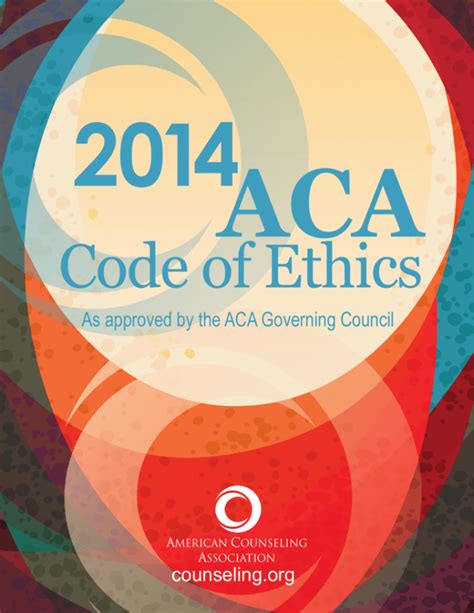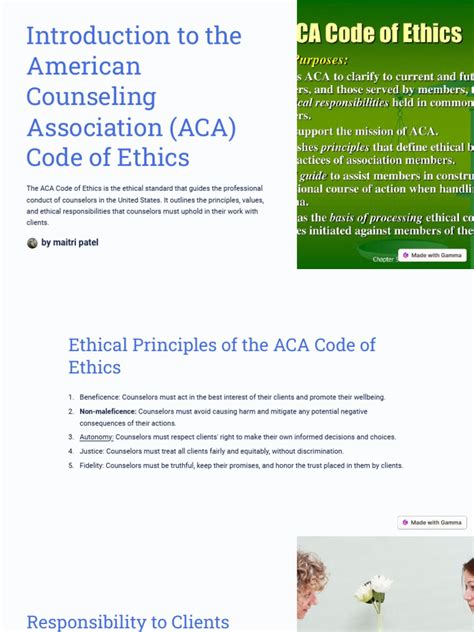Aca Code Of Ethics

The American Counseling Association (ACA) Code of Ethics serves as a foundational document that outlines the ethical standards and principles for professional counselors. The code is designed to promote the welfare and dignity of clients, while also guiding counselors in their professional conduct and decision-making. As a counselor, it is essential to understand the ACA Code of Ethics and its implications for practice.
Introduction to the ACA Code of Ethics

The ACA Code of Ethics is a comprehensive document that covers a wide range of topics, including confidentiality, informed consent, and professional relationships. The code is based on several core principles, including autonomy, non-maleficence, beneficence, and justice. These principles serve as a framework for counselors to make ethical decisions and provide high-quality care to their clients.
Core Principles of the ACA Code of Ethics
The ACA Code of Ethics is guided by several core principles, including:
- Autonomy: Respect for the client’s right to make informed decisions about their care and treatment.
- Non-maleficence: Avoidance of harm or injury to clients, either intentionally or unintentionally.
- Beneficence: Promotion of the client’s well-being and best interests.
- Justice: Fairness and equity in the delivery of counseling services.
| Principle | Description |
|---|---|
| Autonomy | Respect for client autonomy and self-determination |
| Non-maleficence | Avoidance of harm or injury to clients |
| Beneficence | Promotion of client well-being and best interests |
| Justice | Fairness and equity in the delivery of counseling services |

Key Provisions of the ACA Code of Ethics

The ACA Code of Ethics includes several key provisions that are essential for counselors to understand and follow. These provisions include:
- Confidentiality: The duty to maintain client confidentiality and protect client records.
- Informed Consent: The requirement to obtain informed consent from clients before providing counseling services.
- Professional Relationships: The importance of maintaining professional boundaries and avoiding dual relationships with clients.
Confidentiality and Informed Consent
Confidentiality and informed consent are two critical provisions of the ACA Code of Ethics. Counselors have a duty to maintain client confidentiality and protect client records, while also obtaining informed consent from clients before providing counseling services. This includes providing clients with clear and accurate information about the counseling process, including the risks and benefits of treatment.
Key Points
- The ACA Code of Ethics is a comprehensive document that outlines the ethical standards and principles for professional counselors.
- The code is based on several core principles, including autonomy, non-maleficence, beneficence, and justice.
- Counselors have a duty to maintain client confidentiality and protect client records.
- Informed consent is a critical provision of the ACA Code of Ethics, requiring counselors to obtain clear and accurate consent from clients before providing counseling services.
- Professional relationships are essential in counseling, and counselors must maintain professional boundaries and avoid dual relationships with clients.
Implications for Practice
The ACA Code of Ethics has significant implications for practice, as it provides a framework for counselors to make ethical decisions and provide high-quality care to their clients. By adhering to the core principles and key provisions of the code, counselors can promote the welfare and dignity of their clients, while also maintaining the highest standards of professional conduct.
Best Practices for Implementing the ACA Code of Ethics
To implement the ACA Code of Ethics in practice, counselors should follow several best practices, including:
- Stay up-to-date with the latest revisions to the code: Counselors should regularly review the ACA Code of Ethics and stay current with any revisions or updates.
- Seek supervision and consultation: Counselors should seek supervision and consultation from experienced professionals to ensure they are providing high-quality care and adhering to the code.
- Maintain accurate records: Counselors should maintain accurate and detailed records of client interactions, including session notes and treatment plans.
What is the purpose of the ACA Code of Ethics?
+The purpose of the ACA Code of Ethics is to promote the welfare and dignity of clients, while also guiding counselors in their professional conduct and decision-making.
What are the core principles of the ACA Code of Ethics?
+The core principles of the ACA Code of Ethics include autonomy, non-maleficence, beneficence, and justice.
What is the importance of confidentiality in the ACA Code of Ethics?
+Confidentiality is a critical provision of the ACA Code of Ethics, as it requires counselors to maintain client confidentiality and protect client records.
In conclusion, the ACA Code of Ethics is a foundational document that outlines the ethical standards and principles for professional counselors. By understanding and adhering to the core principles and key provisions of the code, counselors can promote the welfare and dignity of their clients, while also maintaining the highest standards of professional conduct. As a counselor, it is essential to stay up-to-date with the latest revisions to the code and seek supervision and consultation to ensure you are providing high-quality care and adhering to the code.



